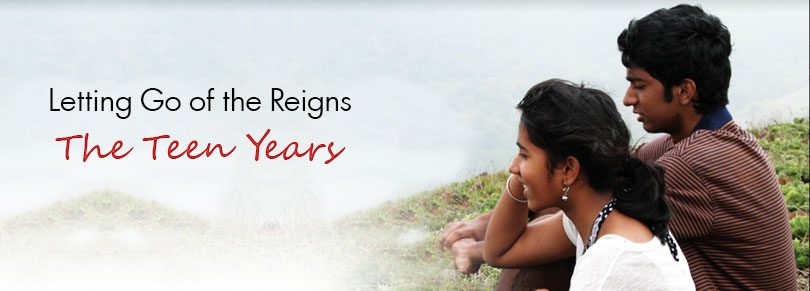Annie and I are parents of two kids – our son Ashwin has just exited his teens and our daughter Nithya is still in her teens. Writing about parenting teens was not easy to do until we stumbled upon the idea of involving the kids to introspect on what we did right and what we could have done better as parents. We trust this reduced the bias that might have come in from a single perspective – that of the parent.
A lot of our parental concerns revolved around the board exams the kids would have to take in their high school and pre-university years – exams that would determine their professional college choices. Being aware of the intense competition for admissions to good colleges, several of their peers opted for special classes or private tuitions after school. We came under pressure to consider similar options. Ashwin opted to self study with additional study notes and use his extra hours for basketball coaching. Nithya opted for special coaching in one subject. As a contingency we decided to keep ourselves available to support them with the other subjects as needed. Our educational background and job flexibility gave us confidence that we could stand by this decision. This approach gave us first hand awareness about how well they were coming along in their studies. On the other hand it also gave rise to conflicts because we sometimes got too concerned about what we knew were their weak areas. Constantly going after them to work on their weak areas did little for their confidence. We both had to learn to step back and give them more space on many occasions.
Like most teens, both Ashwin and Nithya aspired to do well and we only had to support their aspirations. The weight of parental aspirations, unsupported by self motivation from the child, can be too heavy a burden for the child to carry. By the time they graduated from high school both Ashwin and Nithya had clarity on their chosen graduate studies – architecture for Ashwin and pure sciences followed by counseling for Nithya. Since both of us were in the software development profession there was some uncertainty in our minds about the career prospects in these areas. To help them validate their choices we encouraged them to meet with people in their chosen professions. We also took Nithya to a career counselor for advice. In both cases it was clear that their characters and latent abilities resonated very well with their choices; so we could put all our doubts to rest and encouraged them. Our support motivates them to work hard and has given them freedom to be themselves. Early clarity helped Ashwin focus his efforts and he was offered admissions in some of the best architecture schools in the country; Nithya has two more years to go before she graduates from high school.
I learnt an important lesson about teaching life-skills and dealing with anxiety while Ashwin learned how to drive. He picked up the basics of driving from a driving school but determining when he was ready to drive on his own to college was a tough decision to take. Knowing that he had to drive a long distance on some of Bangalore’s most busy roads at peak hours did not make it easy. I decided to first put him through some additional lessons – drive under conditions he would most likely encounter with me beside him. Beyond a point having to handle the road conditions and his dad’s anxiety at the same time was counter- productive. Driving is about using ones own skill and faculties to deal with the vehicle and the situation of the road. So in his interest I had to let him go on his own. His confidence and skill grew fast – faster than I could have taught. Life-skills cannot be mastered only by teaching – exposure to real life situations is when the real learning and confidence develops.
To transition from protective parents to letting go of the reigns is and has been difficult. Our teens, like most teens, kept pulling against the reigns. Whether it was allowing our children to go out with friends shopping, to the movies or other events, we had to learn to deal with our anxieties privately. When only your prayers can accompany your kids what can you fall back on? We had to fall back on our knowledge of our child’s character and values. We had several years to coach them on faith, values and character. Our children absorbed these lessons through all their senses – so what they saw us do had as large a part to play as what we said. Both of them have told us that they appreciated the amount of involvement we had in all that they did, be it studies or extra-curricular activities. On reflection, this was a good investment. We benefited by getting first hand understanding of their individual characteristics – both strengths and weakness. So when we had to give them freedom, we had the assurance that they would make the right choices or at least try to do so. We are confident that they will be honest even when the truth hurts. As part of the introspection while writing this article we probed this question. Both of them responded that in situations where they made mistakes, what they had felt was sometimes shame, sadness and disappointment but not fear to break the bad news to us.
We have found it important and necessary to have individual communication with each child. What works well for us is to take the opportunities we get from our normal routines such as driving my kids to school or other events to discuss important issues. Prior conflicts, explaining our parenting decisions, unhealthy aspects of their behavior, their aspirations, our personal past and the lessons we have learnt from our successes and failures have all been discussed. Almost always it is in the context of some current event that they could relate to. During such communication we had to “talk with” and not simply “talk to” our kids – they policed this line effectively, either tuning out obviously or simply telling us not to preach.
How do I summarize the teen parenting experience? Such questions are difficult to answer briefly and so I will not attempt to do so. For us some key ingredients are faith, communication, openness, willingness to adapt, involvement, trust and the willingness to let go. And enjoy the years while they last.






Leave a Comment